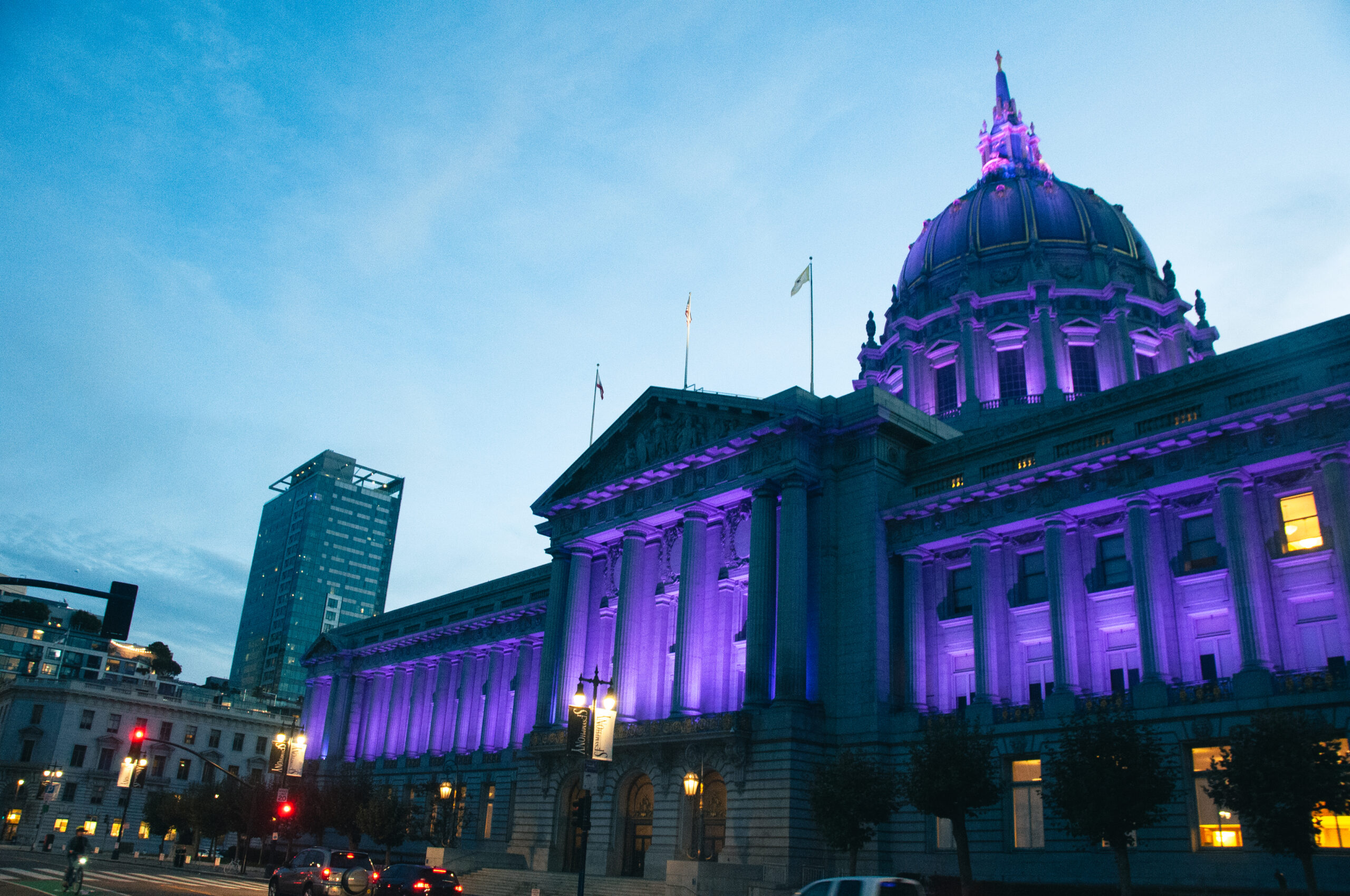San Francisco’s City Hall was illuminated in purple Wednesday night to commemorate Domestic Violence Awareness Month, an event that carried special meaning for two sisters who’ve teamed up to launch a new service and advocacy organization, Black Women Revolt Against Domestic Violence.
The last time Domestic Violence Awareness Month activities took place in person at City Hall was in 2019. San Francisco resident Geoffrea Morris happened to be leaving a meeting at City Hall, and upon exiting the building, she inadvertently became a member of the crowd on hand for the purple-light ceremony.
Looking around, she noticed there were only a few black women in attendance. As an activist in San Francisco’s Black community and the daughter of a mother who suffered from domestic violence, Morris felt compelled to stay at the event. But when she got home she started investigating what city services were available in San Francisco specifically for black women relating to domestic violence–and found nothing.
Morris took this as a sign that she needed to take action, specifically by creating a safe space for black women to seek refuge from domestic violence. Her younger sister, Lyntise Jones, had been looking to launch a related kind of initiative that supported black mothers and children in San Francisco who experience ongoing trauma.
The sisters blended their vision and created Black Women Revolt Against Domestic Violence in 2020. The organization aims to increase awareness of the impact of intergenerational violence in the Black community and provide a designated space specifically for Black women in San Francisco to help them recover from domestic abuse.
Black Women Revolt has been welcomed by the city and other NGOs, including W.O.M.A.N. Inc, another domestic violence support organization that helped them secure their new facility located at 30 Boardman Place, which opened last week. The sisters have also partnered with city organizations like Young Community Developers and were recently awarded a $175,000 grant from Mayor Breed’s Dream Keeper Initiative. They have also received $42,000 from the San Francisco District Attorney’s Victim Services Department.
“This is about a movement of black women supporting each other through hard times,” Morris told us. “When you look at media coverage, black women don’t get the attention they deserve when they become missing, trafficked, or victims of domestic violence.”
Black Women Revolt Against Domestic Violence will run a series of workshops that focus on education, building healthy relationships, violence prevention, and emotional empowerment. The organization is also in the process of launching a peer support training program to allow victims to be counseled by advocates and fellow survivors.
Beginning in January, Black Women Revolt will ramp up programming and offer services 24 hours a day, starting with a hotline where victims can call for support in navigating government assistance.
“We are the ones we’ve been waiting for,” said Jones. “We heal differently, and we don’t want to be in a situation where we are one the few black women in a program that has services that are not culturally relevant. So we have to show up for each other and wrap ourselves in our sisterhood.”
Even with San Francisco’s black population dwindling to less than 5%, data from San Francisco’s Department on the Status of Women shows that in 2020, black residents accounted for 29% of the 7,241 domestic violence calls made to 911.
Pamela Tate, who is Black Women Revolt’s co-executive director, a domestic violence survivor, and former victim services advisory board member for the San Francisco District Attorney’s office, told us that the lack of sensitivity in law enforcement is one of the things that makes the new group essential.
“A lot of black women feel that they are treated differently by police,” said Tate. “We are treated with the expectation that going through this type of trauma is the norm. I don’t believe their response is adequate, and they don’t treat us with care. We may be strong, but if someone is calling the police, that is clearly a cry for help.”
Christine Mason, a black woman who experienced domestic abuse after her ex-partner caused her to dislocate her shoulder, agreed with Tate’s point. She said her experience with SFPD after making the report was just as abusive as what she went through.
“I believe the police came in with a bias against me as a black woman,” said Mason. “On body camera footage, one of the officers said I didn’t look like I was in enough pain to have a dislocated shoulder. This is a longstanding racist trope about black bodies.”
Mason described the process of getting support from law enforcement as incredibly dismissive, bureaucratic and dehumanizing. “When I was at my most vulnerable, I needed someone like a licensed clinical social worker who understands how to help victims navigate trauma and provide safety planning.”
At a virtual community meeting hosted by the Bayview Police Station, Mason offered her criticism directly to SFPD Captain David Maron. He asked to meet with Mason, and two will do so in the near future.
For more information on Black Women Revolt Against Domestic Violence, visit their website.
